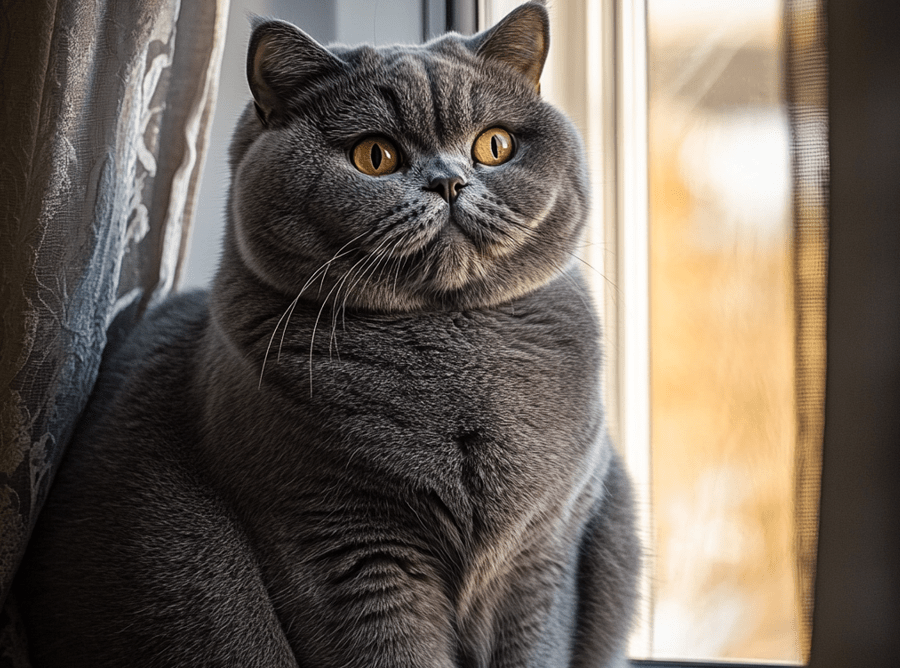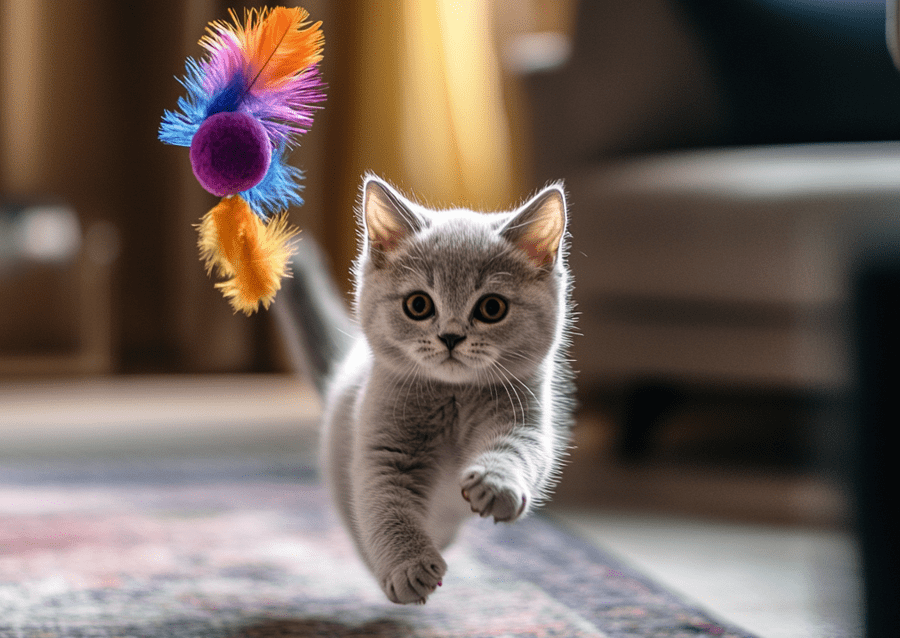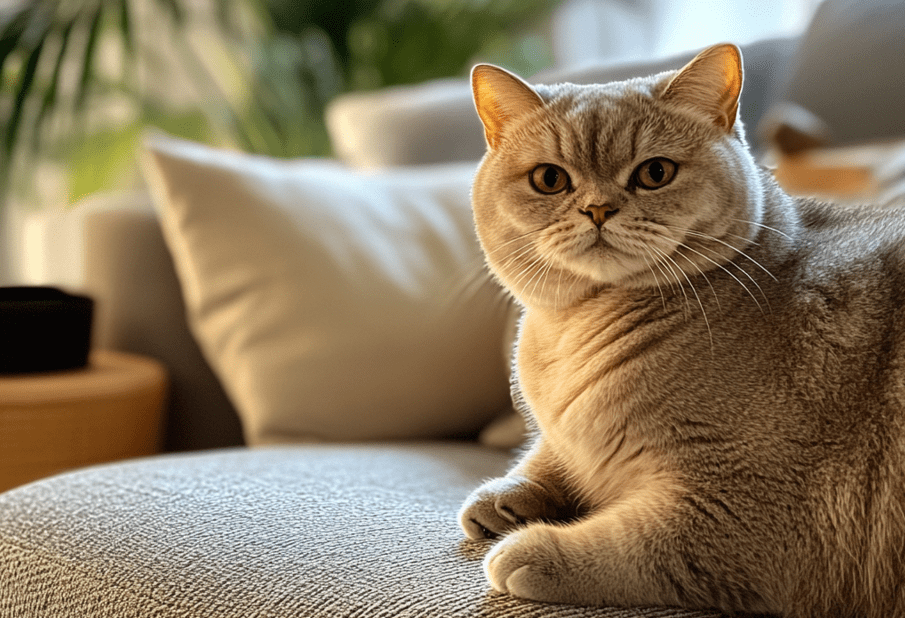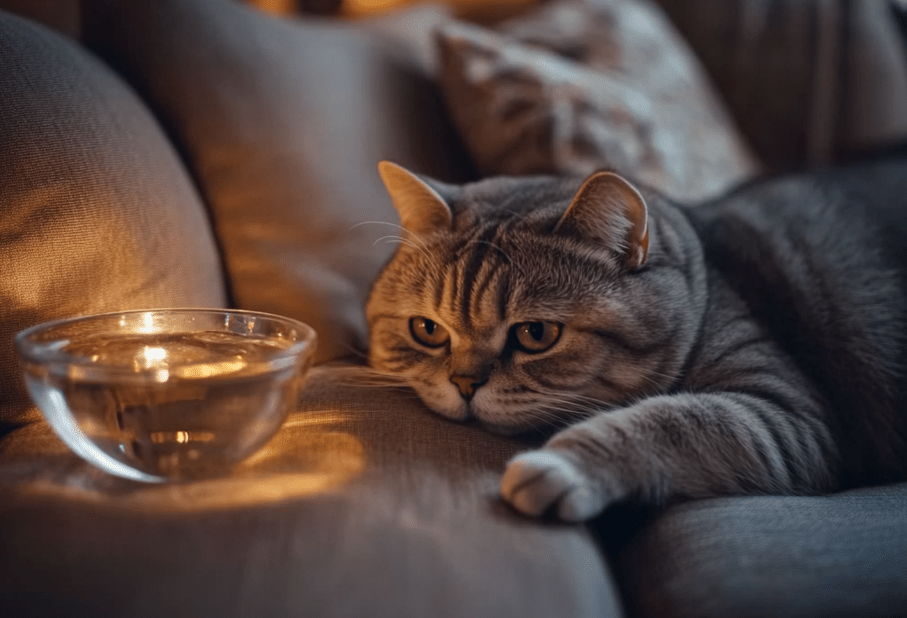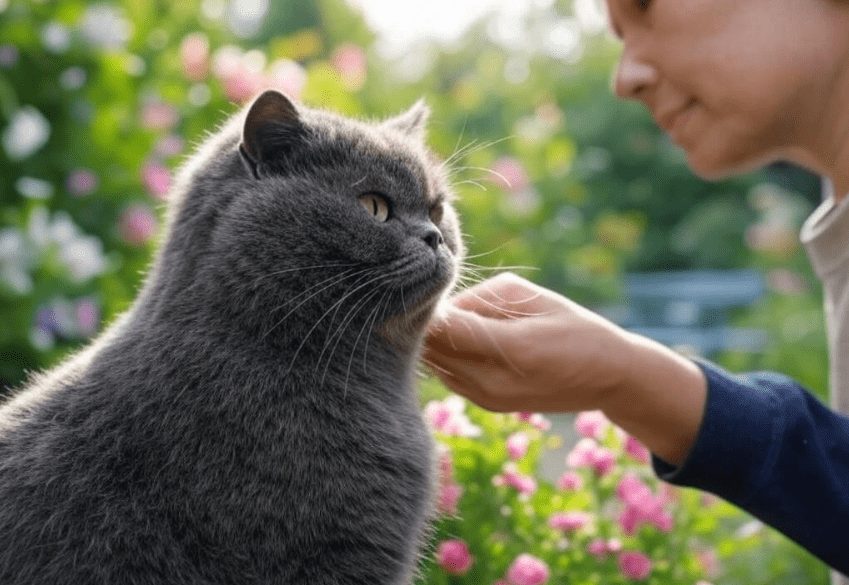
Choosing the right cat food for British Shorthairs is essential to ensure their health, vitality, and stunning plush coat. British Shorthairs, with their sturdy builds and dense fur, have unique nutritional needs that require careful consideration. This comprehensive guide explores what to look for in cat food, key ingredients to prioritize, and how to tailor your British Shorthair’s diet to support their overall well-being. Whether you’re a new or experienced owner, this article will help you make informed decisions to keep your feline friend thriving.
In this guide, we’ll cover the nutritional needs of British Shorthairs, the best types of cat food, ingredients to avoid, and practical feeding tips. Our goal is to provide you with the most detailed and actionable resource on cat food for British Shorthairs, ensuring your cat enjoys a long, healthy life.
Why Nutrition Matters for British Shorthairs
British Shorthairs are a robust breed known for their round faces, dense coats, and muscular bodies. However, their unique physiology means they have specific dietary requirements to maintain optimal health. Proper nutrition supports their coat, weight, digestion, and overall vitality, while poor-quality food can lead to obesity, dull fur, or health issues.
Key Nutritional Needs of British Shorthairs
High-Quality Protein: As obligate carnivores, British Shorthairs require animal-based proteins to support muscle development and energy needs.
Healthy Fats: Omega-3 and omega-6 fatty acids promote a shiny coat and healthy skin, reducing shedding.
Balanced Nutrients: Vitamins, minerals, and taurine are essential for heart health, vision, and immune function.
Weight Management: British Shorthairs are prone to obesity, so portion control and calorie-appropriate food are critical.
Digestive Health: Fiber and probiotics support digestion, especially for cats prone to hairballs or sensitive stomachs.
Choosing the right cat food for British Shorthairs ensures these needs are met, helping your cat stay healthy and active.
Types of Cat Food for British Shorthairs
When selecting cat food for British Shorthairs, you’ll encounter several options, each with its pros and cons. Understanding the differences will help you choose the best fit for your cat’s needs.
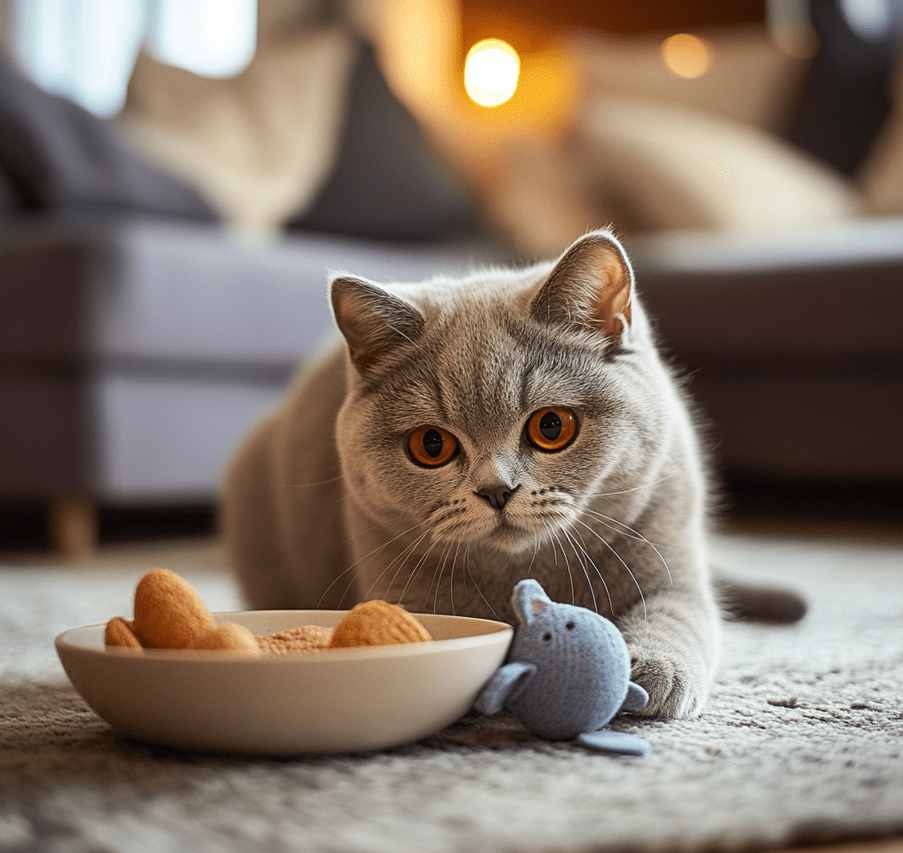
1. Dry Cat Food (Kibble)
Dry food is convenient, cost-effective, and has a long shelf life. It’s also beneficial for dental health, as chewing kibble can help reduce plaque buildup.
Pros
-
Affordable and easy to store.
-
Helps maintain dental hygiene.
-
Available in breed-specific formulas.
Cons
-
Lower moisture content, which may not suit cats prone to urinary issues.
-
Can be high in carbohydrates, contributing to weight gain if not carefully selected.
Best for British Shorthairs
Look for high-protein, low-carb kibble with added omega fatty acids and taurine. Avoid fillers like corn or wheat.
2. Wet Cat Food (Canned)
Wet food is high in moisture, making it ideal for hydration and urinary health. It’s often more palatable for picky eaters.
Pros
-
High moisture content supports kidney and urinary health.
-
Typically higher in protein and lower in carbohydrates.
-
Appealing texture and flavor for finicky cats.
Cons
-
More expensive than dry food.
-
Requires refrigeration after opening and has a shorter shelf life.
Best for British Shorthairs
Choose wet food with named meat sources (e.g., chicken, turkey) as the first ingredient and minimal fillers. It’s especially beneficial for British Shorthairs with urinary concerns.
3. Raw or Homemade Cat Food
Raw or homemade diets consist of fresh, minimally processed ingredients, often mimicking a cat’s natural diet.
Pros
-
Complete control over ingredients and quality.
-
Can be tailored to specific health needs.
-
Often free of artificial additives.
Cons
-
Requires careful planning to ensure nutritional balance.
-
Risk of bacterial contamination if not handled properly.
-
Time-consuming and costly.
Best for British Shorthairs
Consult a veterinary nutritionist to create a balanced raw or homemade diet. Ensure it includes adequate taurine, vitamins, and minerals.
4. Semi-Moist Cat Food
Semi-moist food is less common but offers a middle ground between wet and dry food in terms of texture and moisture.
Pros
-
Palatable and easy to chew.
-
Convenient for travel or occasional feeding.
Cons
-
Often contains artificial preservatives and sugars.
-
Less nutritionally complete than wet or dry food.
Best for British Shorthairs
Use semi-moist food as a treat or occasional meal rather than a primary diet due to its lower nutritional value.
Key Ingredients to Look for in Cat Food for British Shorthairs
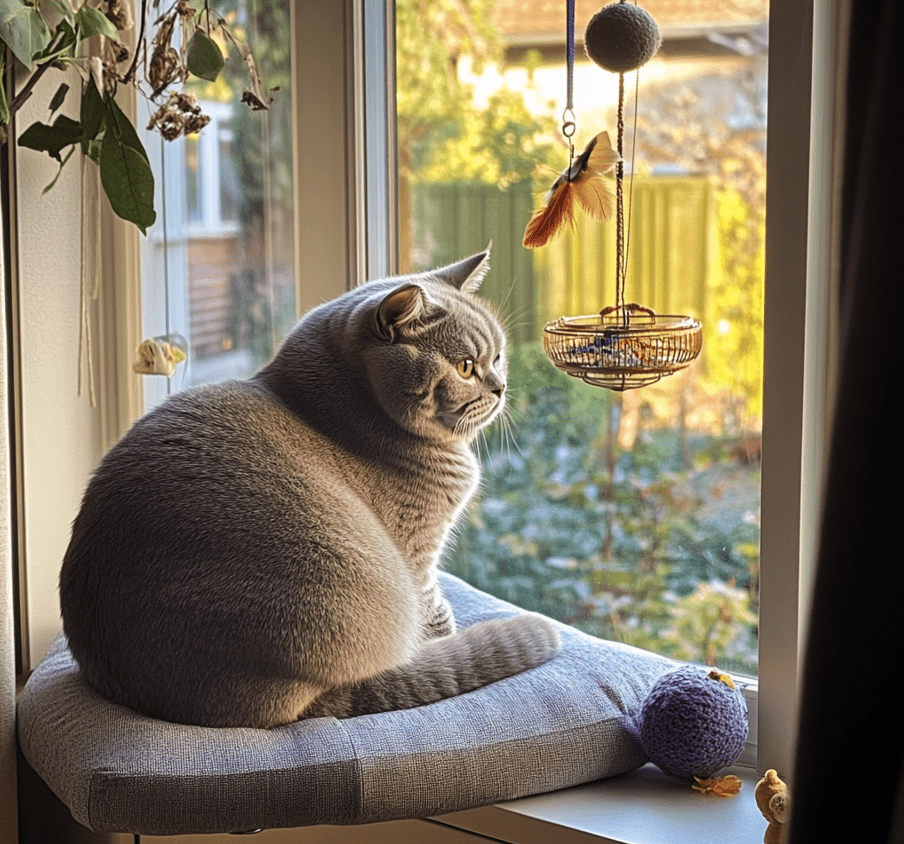
To choose the best cat food for British Shorthairs, prioritize high-quality ingredients that meet their nutritional needs. Here’s what to look for on the label:
1. High-Quality Animal Protein
Why It Matters: British Shorthairs need protein from animal sources (e.g., chicken, turkey, fish) for muscle maintenance and energy.
What to Look For: Named meats (e.g., “chicken” or “salmon”) as the first ingredient. Avoid vague terms like “meat by-products.”
Examples: Chicken breast, turkey, or fish like salmon or mackerel.
2. Omega Fatty Acids
Why It Matters: Omega-3 and omega-6 fatty acids support a shiny coat, reduce shedding, and promote skin health.
What to Look For: Ingredients like fish oil, flaxseed, or chicken fat.
Examples: Salmon oil, menhaden fish oil.
3. Taurine
Why It Matters: Taurine is an essential amino acid for heart health, vision, and reproduction in cats.
What to Look For: Ensure taurine is listed in the ingredients or guaranteed analysis.
Examples: Naturally present in meat-based foods or added as a supplement.
4. Limited Carbohydrates
Why It Matters: British Shorthairs are prone to obesity, and high-carb diets can contribute to weight gain.
What to Look For: Low-carb formulas with minimal grains or fillers like corn, wheat, or soy.
Examples: Sweet potato or pea fiber as low-glycemic carb sources.
5. Vitamins and Minerals
Why It Matters: Nutrients like vitamin A, vitamin E, zinc, and biotin support immune health, coat quality, and overall vitality.
What to Look For: A balanced mix of vitamins and minerals, often listed in the guaranteed analysis.
Examples: Vitamin E supplement, zinc proteinate.
6. Probiotics and Fiber
Why It Matters: Probiotics and fiber promote healthy digestion and reduce hairball issues, which are common in British Shorthairs.
What to Look For: Ingredients like dried chicory root, psyllium husk, or probiotics like Lactobacillus.
Examples: Beet pulp, pumpkin.
By prioritizing these ingredients, you’ll ensure your cat food for British Shorthairs supports their unique needs.
Ingredients to Avoid in Cat Food for British Shorthairs
Not all cat foods are created equal, and some ingredients can harm your British Shorthair’s health. Avoid the following:
1. Artificial Preservatives
Examples: BHA, BHT, ethoxyquin.
Why Avoid: Linked to potential health risks, including cancer, in long-term use.
Alternative: Look for natural preservatives like mixed tocopherols or rosemary extract.
2. Fillers
Examples: Corn, wheat, soy, rice bran.
Why Avoid: Provide little nutritional value and can contribute to weight gain or allergies.
Alternative: Choose grain-free or low-carb formulas with nutrient-dense ingredients.
3. Artificial Colors and Flavors
Examples: Red 40, Yellow 5, “artificial flavor.”
Why Avoid: Unnecessary and may cause allergic reactions or digestive upset.
Alternative: Opt for foods with natural flavors from real meat or broth.
4. Excessive Carbohydrates
Examples: High levels of corn syrup, sugar, or starchy grains.
Why Avoid: Can lead to obesity and diabetes, especially in British Shorthairs.
Alternative: Select foods with low-glycemic carbs or grain-free options.
5. Low-Quality Protein
Examples: Meat by-products, poultry meal, “animal digest.”
Why Avoid: Lower nutritional value and may include undesirable parts of animals.
Alternative: Choose foods with named meat sources as the primary ingredient.
Avoiding these ingredients ensures your cat food for British Shorthairs is safe, nutritious, and beneficial.
How to Choose the Best Cat Food for Your British Shorthair
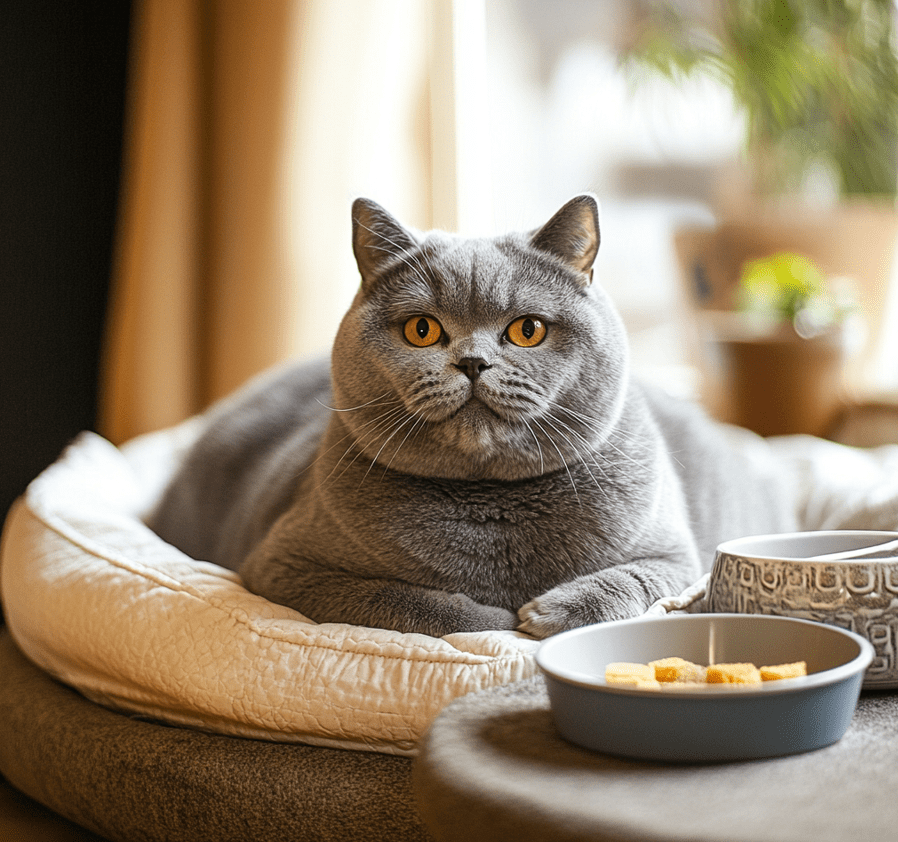
With so many options, selecting the right cat food for British Shorthairs can feel overwhelming. Follow these steps to make an informed choice:
1. Assess Your Cat’s Needs
Age: Kittens, adults, and seniors have different nutritional requirements. Choose age-appropriate formulas.
Health Conditions: Cats with urinary issues, obesity, or allergies may need specialized diets.
Activity Level: Less active British Shorthairs may require lower-calorie food to prevent weight gain.
2. Read the Label
1.Check the ingredient list and guaranteed analysis to ensure high protein, moderate fat, and low carbs.
2.Look for AAFCO (Association of American Feed Control Officials) approval to confirm nutritional adequacy.
3. Consider Your Budget
1.High-quality cat food can be expensive, but investing in premium food reduces long-term health costs.
2.Balance cost with quality by comparing protein content and ingredient lists.
4. Consult Your Veterinarian
1.A vet can recommend specific brands or formulas based on your British Shorthair’s health, weight, and dietary needs.
2.They can also advise on portion sizes and feeding schedules.
5. Transition Gradually
1.Switch to new food over 7-10 days to avoid digestive upset. Mix increasing amounts of the new food with the old food each day.
2.By following these steps, you’ll find a cat food for British Shorthairs that meets your cat’s needs and keeps them healthy.
Feeding Tips for British Shorthairs
In addition to choosing the right cat food for British Shorthairs, proper feeding practices are crucial for their health. Here are practical tips to optimize your cat’s diet:
1. Control Portion Sizes
1.British Shorthairs are prone to obesity, so follow feeding guidelines on the food package and adjust based on your cat’s weight and activity level.
2.Use a measuring cup to ensure accurate portions and avoid overfeeding.
2. Establish a Feeding Schedule
1.Feed adult British Shorthairs 2-3 small meals per day to support digestion and prevent overeating.
2.Avoid free-feeding (leaving food out all day), as it can lead to weight gain.
3. Provide Fresh Water
1.Ensure your cat has constant access to clean, fresh water to support hydration and urinary health.
2.Consider a cat water fountain to encourage drinking, especially for cats on dry food diets.
4. Monitor Weight and Health
1.Weigh your British Shorthair monthly and check for signs of obesity, such as a lack of waistline or difficulty grooming.
2.Watch for changes in appetite, coat quality, or litter box habits, which may indicate dietary issues.
5. Offer Variety Safely
1.Introduce new flavors or textures occasionally to prevent boredom, but avoid frequent changes that may upset digestion.
2.Stick to high-quality brands to maintain consistency in nutrition.
6. Use Food Puzzles or Slow Feeders
1.British Shorthairs can benefit from mental stimulation during meals. Food puzzles or slow feeders encourage slower eating and reduce boredom.
2.Implementing these feeding practices ensures your British Shorthair gets the most out of their diet and maintains optimal health.
Common Dietary Mistakes to Avoid
To maximize the benefits of cat food for British Shorthairs, avoid these common mistakes:
1. Feeding Human Food
1.Human foods like dairy, onions, or chocolate are toxic or unhealthy for cats and can cause digestive issues or nutrient imbalances.
2.Stick to cat-specific food and treats.
2. Overfeeding Treats
1.Treats should make up no more than 10% of your cat’s daily calories to avoid weight gain and nutritional imbalances.
2.Choose healthy treats with high protein and minimal fillers.
3. Ignoring Food Allergies
1.Some British Shorthairs have food sensitivities to ingredients like grains or certain proteins. Watch for signs like itching, vomiting, or diarrhea.
2.Work with your vet to identify and eliminate trigger ingredients.
4. Choosing Cheap, Low-Quality Food
1.Budget foods often contain fillers and low-quality proteins that can harm your cat’s health over time.
2.Invest in premium food to support long-term wellness.
5. Neglecting Hydration
1.Insufficient water intake can lead to urinary issues, especially in cats on dry food diets.
2.Encourage hydration with wet food, water fountains, or broth-based treats.
3.Avoiding these mistakes ensures your British Shorthair’s diet is safe, balanced, and effective.
When to Consult a Veterinarian
While choosing the right cat food for British Shorthairs is a great start, some situations require professional guidance. Contact your veterinarian if you notice:
Weight Changes: Unexplained weight gain or loss that may indicate dietary or health issues.
Digestive Problems: Persistent vomiting, diarrhea, or constipation.
Coat or Skin Issues: Dull fur, excessive shedding, or skin irritation that may signal nutritional deficiencies.
Behavioral Changes: Lethargy, reduced appetite, or increased thirst, which could indicate underlying conditions like diabetes or kidney disease.
Special Health Needs: Conditions like urinary tract issues, obesity, or allergies that require prescription diets.
A vet can recommend tailored dietary solutions and monitor your British Shorthair’s health to ensure their diet is meeting their needs.
Conclusion
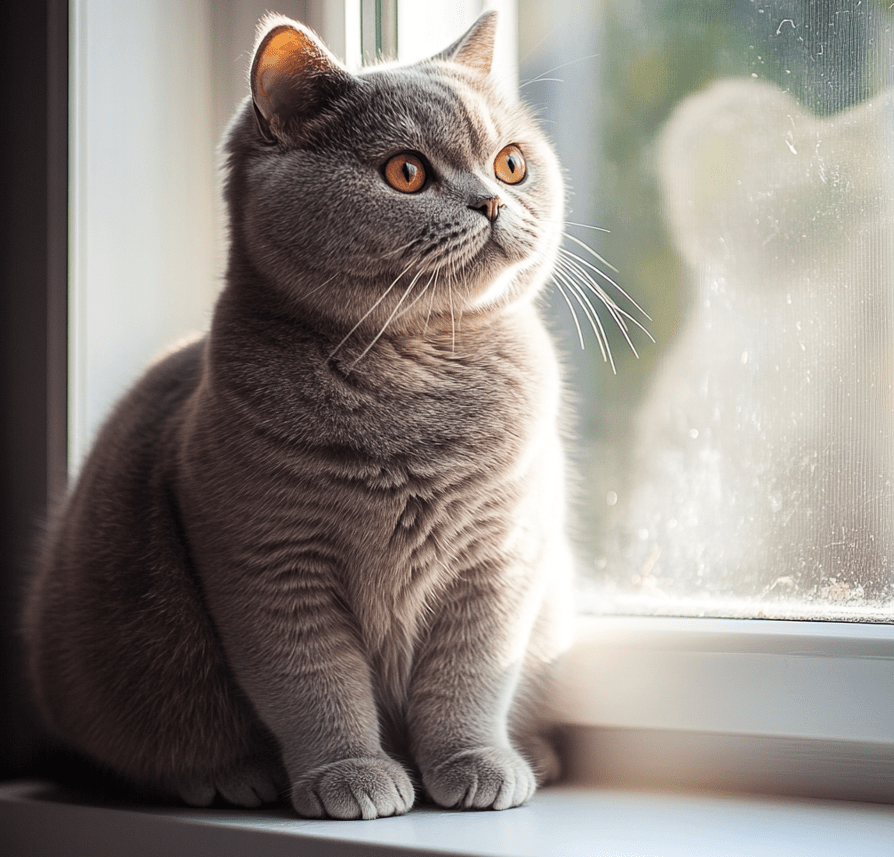
Choosing the best cat food for British Shorthairs is a critical step in ensuring your cat’s health, happiness, and longevity. By prioritizing high-quality protein, omega fatty acids, and essential nutrients while avoiding fillers and harmful ingredients, you can provide a diet that supports your British Shorthair’s unique needs. From selecting the right type of food to implementing proper feeding practices, this guide has covered everything you need to make informed decisions.
With the insights and tips provided, you’re equipped to choose a cat food for British Shorthairs that keeps their coat shiny, their weight healthy, and their energy high. Start optimizing your British Shorthair’s diet today, and enjoy a thriving, vibrant feline companion for years to come!

